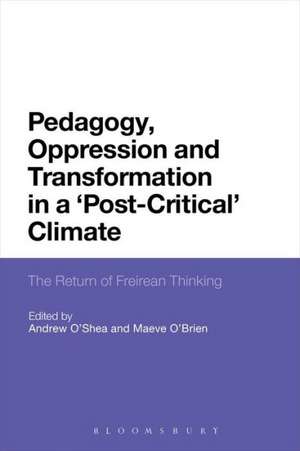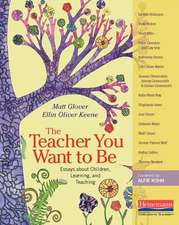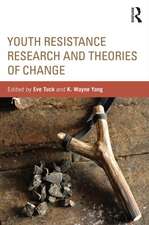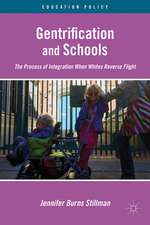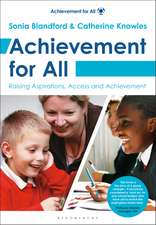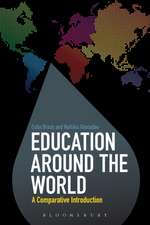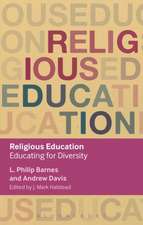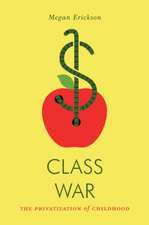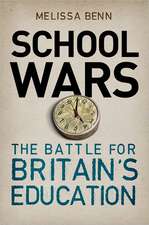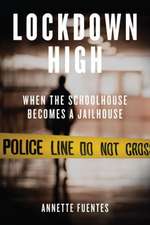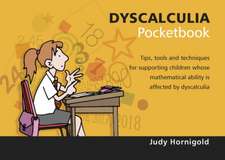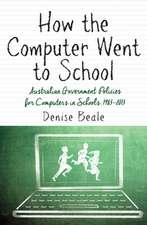Pedagogy, Oppression and Transformation in a 'Post-Critical' Climate: The Return of Freirean Thinking
Editat de Dr Andrew O'Shea, Maeve O'Brienen Limba Engleză Paperback – 27 mar 2013
| Toate formatele și edițiile | Preț | Express |
|---|---|---|
| Paperback (1) | 255.76 lei 6-8 săpt. | |
| Bloomsbury Publishing – 27 mar 2013 | 255.76 lei 6-8 săpt. | |
| Hardback (1) | 1064.44 lei 6-8 săpt. | |
| Bloomsbury Publishing – 21 sep 2011 | 1064.44 lei 6-8 săpt. |
Preț: 255.76 lei
Nou
Puncte Express: 384
Preț estimativ în valută:
48.94€ • 50.79$ • 40.91£
48.94€ • 50.79$ • 40.91£
Carte tipărită la comandă
Livrare economică 17-31 martie
Preluare comenzi: 021 569.72.76
Specificații
ISBN-13: 9781472507280
ISBN-10: 1472507282
Pagini: 192
Ilustrații: 5 illus
Dimensiuni: 156 x 234 x 10 mm
Greutate: 0.28 kg
Editura: Bloomsbury Publishing
Colecția Bloomsbury Academic
Locul publicării:London, United Kingdom
ISBN-10: 1472507282
Pagini: 192
Ilustrații: 5 illus
Dimensiuni: 156 x 234 x 10 mm
Greutate: 0.28 kg
Editura: Bloomsbury Publishing
Colecția Bloomsbury Academic
Locul publicării:London, United Kingdom
Caracteristici
Draws together critical responses from philosophical, sociological and egalitarian perspectives
Notă biografică
Andrew O'Shea is Lecturer in Philosophy of Education and Human Development at St. Patrick's College, Dublin City University, Ireland. Maeve O'Brien is Senior Lecturer in Sociology and Co-ordinator of Human Development at St. Patrick's College, Dublin City University, Ireland.
Cuprins
AcknowledgementsIntroduction, Andrew O'Shea (St Patrick's College, Dublin City University, Ireland) and Maeve O'Brien (St Patrick's College, Dublin City University, Ireland)1. Towards a Pedagogy of Care and Well-Being: Restoring the Vocation of Becoming Human through Dialogue and Relationality, Maeve O'Brien (St Patrick's College, Dublin City University, Ireland)2. Paulo Freire and the Tasks of the Critical Educational Scholar/Activist, Michael W. Apple (University of Wisconsin, Madison, USA)3. Resistance, Struggle and Survival: The University as a Site for Transformative Education, Mags Crean (University College Dublin, Ireland) and Kathleen Lynch (School of Social Justice, University College Dublin, Ireland)4. Liberal Education, Reading the Word, and Naming the World, D. G. Mulcahy (Central Connecticut State University, USA)5. Conscientization: The Art of Learning, Anne Ryan (Adult and Community Education in National University of Ireland, Maynooth, Ireland)6. Taking Educational Risks With and Without Guaranteed Identities: Freire's 'Problem-Posing' and Judith Butler's 'Troubling', Karl Kitching (University College Cork, Ireland)7. A Post-Modernist Rendering of Freire's Educational Vision? Some Reflections on the Birmingham Centre for Contemporary Cultural Studies, Jones Irwin (St Patrick's College, Dublin City University, Ireland)8. Rethinking Transformation in Light of Post-Modern Education: 'Freire is Dead, Long Live Freire!' Andrew O'Shea (St Patrick's College, Dublin City University, Ireland)BibliographyIndex
Recenzii
This book provides a thoughtful reassessment of the work of Paulo Freire against the background of recent developments in the theory and practice of education. It provides a powerful reminder of the need to bring the personal back into the political project that education ultimately is.
This text is timely, prescient, passionate and purposeful, bringing together a set of powerful voices, perspectives and dispositions that breathe new possibilities into pedagogies more likely to liberate and transform than oppress and marginalise ... an important contribution to contemporary educational discourses that is at once deeply humanising, enriching and rewarding. Read it, and be inspired to continue Freire's transformative agenda.
This compelling book is an important challenge to the new framing of education in a post-critical climate. It addresses the question of educational transformation by exploring the potential in Freire's work for liberation through radical pedagogy and praxis that takes relationality and the affective domain of life seriously.
During his life-time, no voice in education was more powerful or distinctive than that of Paulo Freire. Why is this voice still so alive in contemporary education? How does it still speak to economic, political and cultural realities very different from those that Freire himself addressed? And how does his philosophy - with its peculiar synthesis of Marxist, existentialist and Christian influences, and its unabashed avowal of "humanisation" - withstand the post-structuralist revolution in contemporary theory and the 'post-humanism' that it announces? To recycle the catch-phrases of his writings was never to be Freirean. But, in this new climate, can any voice be truly Freirean? Anyone interested in these questions, and their heavy implications for how we practice and think about education, can do no better than to read this book.
This text is timely, prescient, passionate and purposeful, bringing together a set of powerful voices, perspectives and dispositions that breathe new possibilities into pedagogies more likely to liberate and transform than oppress and marginalise ... an important contribution to contemporary educational discourses that is at once deeply humanising, enriching and rewarding. Read it, and be inspired to continue Freire's transformative agenda.
This compelling book is an important challenge to the new framing of education in a post-critical climate. It addresses the question of educational transformation by exploring the potential in Freire's work for liberation through radical pedagogy and praxis that takes relationality and the affective domain of life seriously.
During his life-time, no voice in education was more powerful or distinctive than that of Paulo Freire. Why is this voice still so alive in contemporary education? How does it still speak to economic, political and cultural realities very different from those that Freire himself addressed? And how does his philosophy - with its peculiar synthesis of Marxist, existentialist and Christian influences, and its unabashed avowal of "humanisation" - withstand the post-structuralist revolution in contemporary theory and the 'post-humanism' that it announces? To recycle the catch-phrases of his writings was never to be Freirean. But, in this new climate, can any voice be truly Freirean? Anyone interested in these questions, and their heavy implications for how we practice and think about education, can do no better than to read this book.
